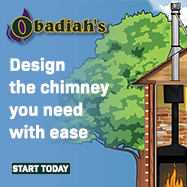Wood Cookstoves: The Alternate Source For Your Everyday Life, by Sarah C.
Wood heat: Is it really the best source, and why? This seems to be a popular question. I’m sure you have heard about the many benefits of an alternative energy source, but how much do you really know about wood heat? Maybe you remember that you grandmother used to cook on a wood cookstove back in the day, but you probably assume that wood cooking is old fashioned and outdated -- think again! How much do you spend a year to heat your home? Not to mention the additional cost of cooking your food, and heating your water. We just filled up our propane tank the other day, and the cost was over $1,200! For that price, you can almost buy an alternative heat source, water source, and cooking source. If your interested in switching your home to a simpler, cheaper, more self-sufficient abode, you’ve come to the right place. In the following paragraphs I plan to answer common questions about heating with wood; I will share with you what I’ve learned about using wood heat, and how beneficial it has been for my family.
I have been living in Montana since age six. For many of my younger years, my parents chose to live a very simple lifestyle; one that happened to be off grid. Having lived off grid, I am now able to understand the benefits of solar energy and biofuel. My dad became interested in solar energy and pursued building a house completely disconnected from all electricity. We powered our home from sources such as the sun, wind, and wood. My family lived off the land. We had a wood cookstove called the “Kitchen Queen” to heat our home. Before moving to Montana, my parents started an e-commerce business called Obadiah’s Woodstoves which sells products used for a more self-sufficient lifestyle. We sell many different products such as wood furnaces, free standing stoves, fireplace inserts, zero clearances fireplaces and other fuel burning products such as gas and pellet burning appliances. After working the business for nearly 10 years, I have learned much about using alternate sources as a way of life.
For the first few years living in Montana, we didn’t have “instant” hot water. We had a ten gallon water tank that had a wood firebox underneath the tank to heat the water. Every time we wanted to take a shower, we had to go outside and chop kindling to build a fire for hot water. After a few years, this became a major hassle; it took nearly an hour to get a tank of hot water large enough for two very quick showers. My dad came to the realization we needed a more efficient source to heat our hot water. He began to research how we could possibly heat our water through our Kitchen Queen cookstove and found an invention called the “thermo-front” hot water heater. Not only did the Kitchen Queen heat our home, it was plumbed into our domestic hot water as well. The thermo-front is a steel box, lined with Teflon; this box fits inside your firebox on the right-hand side. You then plumb from the thermo-front directly into your domestic hot water system. You also have the option of plumbing this into radiant heating; which is another option to heat your home. The only thing better than hot water, is free hot water!
Domestic hot water is not the only water source the Kitchen Queen has to offer; it also has an optional stainless reservoir that sits on the rear of the stove. The reservoir can be plumbed through your firebox with a stainless water coil. However, it is not a pressurized system; since the tank is not pressurized, it cannot be plumbed through your domestic hot water. You have the option to install a water spigot on the side of the reservoir for easy access to the water, otherwise the water is accessed through the lids on the top of the reservoir. Many folks without access to electricity or plumbing such as the Amish, will use the water reservoir for their main hot water needs. You can use the water for bathing, doing dishes, cleaning up around the house, or taking care of children. When installing the water coil with the reservoir, you have to be sure not to let the water boil in the reservoir; if this happens, it can cause mold and mildew to grow in your home. However if the reservoir is used properly, it works great as a humidifier. Although the reservoir is made of stainless steel, the water is not safe to drink. Standing water in the tank creates a breeding ground for bacteria and other airborne contaminants.
A wood cookstove has many options and benefits to suffice your domestic needs. One of my favorite features of a wood cookstove is that it offers the luxury of a wood heat oven; it is much like one on an electric stove -- minus the fixed temperature. This oven serves two purposes; it gives your home that cozy warm to the bone feeling and it also has potential to make the best apple pie you’ve ever tasted. Talk about killing two birds with one stone! Many cookstoves offer a large firebox, which is great for overnight burn times; no hassle, no worries. If you burn properly seasoned firewood, and have knowledge of how to pack a full firebox; you can sometimes get a 20 hour burn time!
Because I work in sales for alternative energy products, I come across many people who have no expertise in wood heat. Most people don’t realize how simple it is to use wood as your main energy source. Most wood cookstoves are non-catalytic, which implies they aren’t as efficient. Although cookstoves may not be as efficient as a catalytic wood stove; cookstoves are a care free stove; you can easily burn paper and bark in your firebox with no problems. Catalytic wood stoves have a type of a filter that re-burns the smoke, thereby reducing emissions and making the stove more efficient. With a catalytic converter, you cannot burn any green wood, wet wood, bark, paper, or any trash without clogging the catalyst. Currently, there is a national exemption by the E.P.A. for wood cookstoves. This means that a wood burning cook stove does not have to be E.P.A.-compliant for emissions. Emissions measures the amount of particulate that is being put into the air when the stove is burning. Studies indicate that more pollution is created in the environment from fallen dead trees that are left in the forest to rot. These trees out-gas more pollution than a wood stove! We can thank our environmentally friendly “green” organizations for closing the woods off to the public. The roads are literally gated to prevent the harvesting of firewood, hunting, or other recreational use of the vast National Forest lands here in Montana. Well, that is another subject for discussion at a later time.
The average household will use between 8-to-12 cords of wood a year [in northern climates]. According to the Consumer Energy Center: “The dimensions of a “standard cord" is a stack of wood piled 8 feet long, 4 feet wide and 4 feet high. You won't get a full 128 cubic feet of firewood with a standard cord because of the airspace between the pieces of the wood; the amount of wood in such a stack will depend upon the size and straightness of the pieces, how they are split and how the wood is stacked. Because of this, the total cubic feet in a cord can vary from 70 to 90 or more cubic feet.” Depending on your location, a cord of wood cost around $100, or you always cut your own wood for free -- it doesn’t get any better than free. Its comforting to know that no matter what happens with the economy, you can always chop down a tree to provide heat, water, and food for your family.
Not only was our heat and water sourced from alternative energy, we also had solar panels that produced on sunny days; if the sun wasn’t shining, we also had a back up generator that would keep our battery bank charged. It is reassuring to know that no matter what happens you can always be warm, cook your food, make hot water, and light your home! By using alternative energy sources you are able to do all things listed above. It’s amazing how simple, economical and self-sufficient a person can survive when having the correct tools.
Posted on Friday, June 1, 2012






